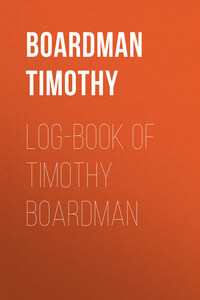Under the auspices of the Rutland County Historical Society, is published the Log-Book of Timothy Boardman, one of the pioneer settlers of the town of Rutland, Vermont. This journal was kept on board the privateer, Oliver Cromwell, during two cruises; the second one from New London, Conn., to Charleston, S. C.; the third from Charleston to New London, in the year 1778. It seems that the Log-Book of the first cruise was either lost, never kept, or Mr. Boardman was not one of the crew to keep it. It was kept as a private diary without any view to its ever being published.
When this manuscript, on coarse, unruled paper, was brought to light, it came to the knowledge of the officers of the county historical society, who, at once, decided that it was a document of considerable value and should be published. Correspondence was accordingly opened with the Rev. Samuel W. Boardman, D.D., of Stanhope, New Jersey, a grandson of Timothy, to whom this document properly belonged, asking his permission to allow the society to publish it. The Reverend Doctor immediately gave his consent; and in his own words: “Supposed it was largely dry details. Still these may throw side lights of value, on the history of the times.” At the same time he also consented to furnish a biographical sketch of his grandfather to be published with the Log-Book. Accordingly the sketch was prepared, but it proves to be not only a sketch, but a valuable genealogy of that branch of the Boardman family. This sketch was collected from many sources, mostly from manuscripts.
The Boardmans in Rutland county are all known as a strictly industrious, upright, religious, scholarly race; and they are so interwoven with the early history, business and educational interests of the county, that this document must meet with general favor and interest.
John M. Currier,
Sec. of the Rutland County
Historical Society.
There is still preserved a letter from England, written in a fine hand, with red ink, dated Obeydon? Feb. 5, 1641, and directed,
“to her very loveing sonne Samuel Boreman, Ipswich in New England give this with haste.”
The letter is as follows:
“Good sonne, I have receaved your letter: whereby I understand that you are in good health, for which I give God thanks, as we are all – Praised be God for the same. Whereas you desire to see your brother Christopher with you, he is not ready for so great a journey, nor do I think he dare take upon him so dangerous a voyage. Your five sisters are all alive and in good health and remember their love to you. Your father hath been dead almost this two years, and thus troubleing you no further at this time, I rest, praying to God to bless you and your wife, unto whome we all kindly remember our loves.
Your ever loving mother,
“Julian Borman.”
This letter exhibits many of the characteristics of the Puritans to whom the Bormans belonged. They were intensely religious; this short letter contains the name of God three times and speaks of both prayer and praise. The Puritans were an intelligent people, reading and writing; this letter is a specimen of the correspondence carried on between the earliest settlers and their kindred whom they had left in England. They were an affectionate people, “remembering their loves” to one another; and praying, for one another, as this mother did for her son and his wife. This short letter has the word “love” four times.
They were a persistent people, those who came hither did not shrink from the hardships around them. They came to stay, and sent back for their friends. Samuel desired Christopher to follow him. Many of their families were large, there were at least nine members of this Puritan household. Samuel was born probably about 1610; he had emigrated from England in 1635 or 1636. His name is found at Ipswich, Mass., about 1637 where land was assigned to him. Ipswich had been organized in 1635 with some of the most intelligent and wealthy colonists. His father died after Samuel’s emigration to America, in 1639. His wife’s name was Mary; their oldest child, so far as we have record, was Isaac, born at Wethersfield, Ct., Feb. 3, 1642. He probably journeyed through the wilderness from Ipswich, Mass., which is twenty-six miles north of Boston, to Wethersfield, Ct., about one hundred and fifty miles, in 1639 or 1640.
Between 1630 and 1640 many of the best families in England sent representatives to America. It is said that Oliver Cromwell was at one time on the point of coming. Between February and August, 1630, seventeen ships loaded with families, bringing their cattle, furniture and other worldly goods, arrived. One ship of four hundred tons brought one hundred and forty passengers, others perhaps a larger number. Among them were Matthew and Priscilla Grant, from whom Gen. Grant was of the eighth generation in descent. Bancroft says, “Many of them had been accustomed to ease and affluence; an unusual proportion were graduates of Cambridge and Oxford. The same rising tide of strong English sense and piety, which soon overthrew tyranny forever in the British Isles, under Cromwell, was forcing the best blood in England to these shores.” The shores of New England says George P. Marsh, were then sown with the finest of wheat; Plymouth Rock had but just received the pilgrims; the oldest cottages and log-cabins on the coast were yet new, when Samuel Boreman first saw them. The Puritans were a people full of religion, ministers came with their people; they improved the time on the voyage, Roger Clap’s diary, kept on shipboard 1630, says, “So we came by the good hand of our God through the deep








